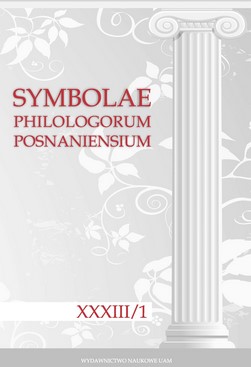Mityczny potwór Kampe w „Fasti” Owidiusza
The Mythical Monster Campe in Ovid’s Fasti
Author(s): Krzysztof Tomasz WitczakSubject(s): Ancient World, Greek Literature, Theory of Literature
Published by: Uniwersytet Adama Mickiewicza
Keywords: acrostic; Ancient Greek literature; fantastic animals; Fasti; Greek mythology; Ovid;
Summary/Abstract: The aim of this paper is to review testimonies devoted to the mythical monster called Campe (Gk. Κάμπη), named after the large sea-animal called κάμπη (originally ‘caterpillar, silkworm’). Campe was a large female monster acting as a guard in Tartarus. She was killed by Zeus (Ps.-Apollodorus, Bibl. I 2,1; Nonnos, D. XVIII 233–264). A different monster by the same name was destroyed and buried by the god Dionysus in the Libyan town of Zabirna (Diodorus, Bibl. III 72). The same mythical monster is also described in the third book of Ovid’s Fasti (lines 793–808). The Roman poet did not mention the Greek name of the mythical monster, but he concealed it as the acrostic CAMPH representing a Latin transcription of the Greek word Καμπη. Unfortunately, this acrostic is preserved in the corrupted form CQMPH in most preserved codices of Ovid’s poem. In the present paper the attempt is made to provide and explain the reasons for this corruption.
Journal: Symbolae Philologorum Posnaniensium Graecae et Latinae
- Issue Year: XXXIII/2023
- Issue No: 1
- Page Range: 451-465
- Page Count: 15
- Language: Polish

